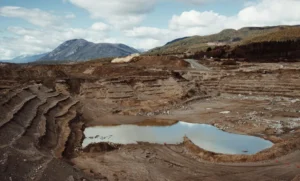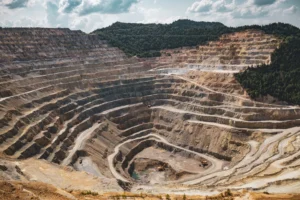The sustainability of ecosystems and human well-being depends on biodiversity. It comprises a great range of living forms that are essential to both the health of our world and ourselves. It’s not just about the animals and plants we see on a daily basis but tiny organisms are essential too.
We require immediate conservation efforts because more than a million species are in danger of going extinct. Medicine, food security, climate regulation, and ecosystem stability are all impacted by biodiversity.
Biodiversity is important for both ecosystems and humans. Maintaining it is essential for our resources and a climate that will be habitable for coming generations.
Why is Biodiversity Important?

Biodiversity is significant for life on Earth. It is necessary for the healthy ecosystems which provide us with healthy air, clean water, food, medicine, better weather, essential resources that we rely on and a secure environment to live.
Let’s look into how biodiversity works, why is biodiversity so important for us and why is biodiversity necessary for the planet.
Ecological Importance of Biodiversity
Importance of Biodiversity for Ecosystem Stability
The stability of ecosystems depends on biodiversity. Preserving the distinct roles that various species play helps ecosystems tolerate changes in the environment.
Diversified ecosystems are more resistant to stress, such as invasive species and climate change. This serves as a built-in protection system.
Examples of Ecosystems and their Resilience to Stressors
Tropical rainforests recover from natural disturbances, coral reefs survive bleaching events, and wetlands protect against flooding and pollution.
Adapting to changing conditions requires resilience, which biodiversity develops in all ecosystems from alpine regions to grasslands.
Impact of Species Loss on Ecosystem Dynamics
Species loss changes how ecosystems work and can upset important connections. Habitat loss and pollution weaken the stability of ecosystems, it badly effects genetic diversity and species diversity, which has a big impact on the number of species and the services ecosystems give you.
Every species contributes in a different way to nutrient cycle and population management. Especially crucial to maintaining environmental balance are pioneer species and keystone species, such as top predators.
Examples of Ecosystem Disruptions due to Species Decline
There are many examples of problems caused by species decline. Losing top predators may set trophic cascades, and plants that don’t have enough pollinators may not be able to reproduce.
When too many fish are caught, aquatic ecosystems are hurt, while land ecosystems face habitat loss and a loss of species.
It also hurts coral reefs and tropical woods. These problems show why is biodiversity important to protect the ecosystems services.
Ecosystem Services by Biodiversity

Water Filtration
Role of Biodiversity in Filtering Pollutants from Water
Biodiversity is very important for cleaning water. In this process, different living things play a part.
Pollutants are broken down by microorganisms such as bacteria and algae, while bigger organisms such as aquatic plants and filter feeding animals trap and absorb contaminants.
In wetlands, these interactions help keep the water clean and stop problems like eutrophication.
Examples of Ecosystems Providing Water Filtration Services
It is normal for wetlands to filter water by trapping sediments and absorbing nutrients from runoff. Riparian zones, which are areas next to rivers, keep the banks stable and clear out pollutants.
Forests capture and filter sediments, nutrients, and pollutants from runoff. Coral reefs and other habitats along the coast remove sediment and take in nutrients, which keeps the water clear.
Food Security
Contribution of Biodiversity to Sustainable Food Production
Biodiversity supports sustainable food production by boosting essential ecosystem services. Bees and other pollinators boost crop yields and many species also help to keep soil healthy and manage pests.
Enhancement of biodiversity on farms increases soil fertility and crop resilience while reducing the need for synthetic inputs.
Impact of Biodiversity Loss on Agricultural Productivity
Losing biodiversity hurts farming because it messes up vital services ecosystems provide. Crop productivity decreases, and pollination costs increase for farmers as pollinators decline.
Crops are more easily affected by pests without the presence of natural predators and a diverse soil ecosystem, which reduces the sustainability of farming.
Flood Protection
Importance of Soil Biodiversity in Flood Prevention
Soil biodiversity helps keep floods from happening by making the soil stronger and better able to hold water. Microbes make pore spaces in the soil that allow water to soak in, and discharge is lessened.
Soil microorganisms also keep the soil from washing away and keep it stable when it rains a lot.
Economic Benefits of Natural Flood Protection
Natural flood prevention supported by soil biodiversity is more economical than traditional infrastructure. Preserving wetlands and riparian zones saves money on engineered structures.
These natural solutions helps in conservation efforts such as water conservation and also improve water quality, support biodiversity, and offer recreational opportunities.
Human Health and Biodiversity
Disease Prevention
Link between Biodiversity Loss and Disease Outbreaks
Disease outbreaks, especially those spread from animals to people such as COVID-19, SARS, and Ebola are more likely when biodiversity is lost.
Diseases can more easily spread to humans when ecosystems are upset by human activities such as habitat destruction and wildlife trade. Diseases spread through improper species interactions brought on by reduced biodiversity.
Examples of Zoonotic Diseases Transmitted from Wildlife to Humans
Zoonotic diseases are big health risks and include:
- Ebola Virus: Comes from fruit bats and causes serious outbreaks in Africa.
- Lyme Disease: Diseases are spread by ticks that bite sick animals.
- COVID-19: Likely started with bats and caused a global pandemic.
- HIV/AIDS: Started with primates in Africa and spread globally.
- H1N1 Flu: Came from pigs and caused the 2009 flu pandemic.
These cases demonstrate why is biodiversity important and the need of preserving biodiversity in order to prevent future epidemics.
Medicinal Benefits
Role of Biodiversity in the Development of Medicines
Medicine production depends on biodiversity. Natural sources of many medications include plants, animals, and microscopic creatures. These medications include antibiotics, cancer therapies and painkillers, which have changed the way we look after our health.
Examples of Medicines Derived from Natural Compounds
Many medicines are made from natural sources, such as:
- Quinine: From cinchona tree bark, fights malaria.
- Aspirin: From willow bark, eases pain.
- Paclitaxel: From Pacific yew trees, fights cancer.
- Penicillin: Made by Penicillium fungus, fights infections.
- Vincristine: From Madagascar periwinkle plants, fights cancer.
- Erythromycin: Made by Streptomyces erythraeus bacteria, fights infections.
- Artemisinin: From sweet wormwood plants, treats malaria.
These examples show how important biodiversity is for making new medicines, highlighting why is biodiversity important and why we need to protect natural habitats for future medical breakthroughs.
Economic Importance of Biodiversity
Economic Value
Estimation of the Economic Value of Ecosystem Services
Ecosystem services are very important to the economy because every year they add trillions of dollars to the world economy.
Important resources such as food, clean water, and climate control are provided by processes like pollination, healthy soil, clean water and carbon storage.
Impact of Ecosystem Destruction on Global Economy
It’s dangerous for businesses to destroy ecosystems. It hurts the environment and costs a lot of money.
People are hurt by natural problems that get worse as a result of less food being grown, higher health care costs, and job loss.
Threats to Economic Stability
Economic Risks Associated with Biodiversity Loss
It costs a lot of money to lose biodiversity. When ecosystems get messed up, crops don’t produce as much, prices go up, and businesses that need clean water suffer a lot.
Losing biodiversity hurts jobs in fishing and tourism, which hurts the world economy across the board. To fix this, we need to keep our industry healthy and protect biodiversity.
Examples of Economic Losses due to Ecosystem Collapse
Ecosystems that break down affect various things in many areas, such as gardening and fishing. These issues get worse when habitats are destroyed, fishing towns are overfished, and soil is messed up.
This hurts fishing towns, farms, and tourists. For example, fishing and tourism both lose money when fish numbers drop or coral reefs die. Less food from fields and fewer jobs in the country are also caused by soil erosion.
Sustainable Business Opportunities
Potential Economic Benefits from Investing in Natural Resources
Investing in natural resources the right way can bring in a lot of money, make more jobs, and improve ecosystems.
Things such as sustainable farming, managing forests sustainably, eco-friendly solutions, sustainable practices, waste management, eco-friendly tourism and renewable energy projects give lasting benefits and help grow businesses while protecting nature, making the planet healthier and helping communities grow.
Social and Cultural Significance of Biodiversity
Cultural Practices and Beliefs
Influence of Biodiversity on Cultural Traditions and Beliefs
For indigenous groups that believe nature is sacred, biodiversity is especially important for keeping their customs alive. Animals and plants are signs of power and the way that everything is linked.
Examples of Species as Symbols in Different Cultures
Different species mean a lot in different cultures. For example, eagles stand for strength and freedom while lotus flowers represent purity and wisdom in eastern religions.
Lions symbolize bravery and kingship, and olive branches mean peace and harmony. These connections show why is biodiversity important in shaping what people think and believe.
Social Connection to Nature
Emotional and Spiritual Connection to Biodiversity
Biodiversity brings out strong emotions and spiritual connections that go beyond cultures. Lots of people feel peace and inspiration in nature’s beauty.
For indigenous groups, nature is spiritually important, guiding their traditions and stressing harmony with the land. This deep connection motivates efforts to conserve and protect hotspots and species.
Role of Indigenous Communities in Biodiversity Conservation
Protecting biodiversity is very important for indigenous groups. They take care of the land and protect natural resources by using what they have learned over time. Because they know their surroundings so well, they make things that will last and keep their society strong.
Conclusion
Ecosystems, societies, and economies have long depended critically on biodiversity. Its benefits are priceless, which include shielding us from floods and making life richer.
Preserving biodiversity must be our first concern in order to make sure a better future with issues such as climate change and habitat loss. Conservation cannot succeed unless people, communities, governments, and organizations collaborate.
It is time for every one of us to accept the role of protectors of the planet and supporters for biodiversity. Let’s all work to support biodiversity every day.
FAQ's
1. What are the 5 benefits of biodiversity?
2. What are the 5 significance of biodiversity?
3. What are 10 reasons why should we care about biodiversity?
We should care about biodiversity because it:
- Provides essential ecosystem services
- Supports food security and agriculture
- Offers potential for new medicines
- Maintains genetic diversity for future generations
- Contributes to cultural and spiritual values
- Boosts economic opportunities through tourism and other industries
- Helps mitigate climate change
- Protects water quality and quantity
- Maintains soil health
- Supports pollination and seed dispersal






